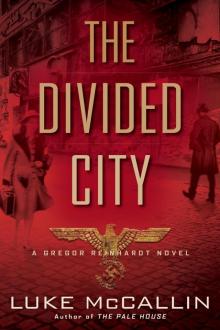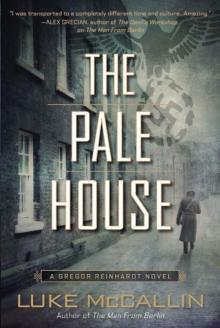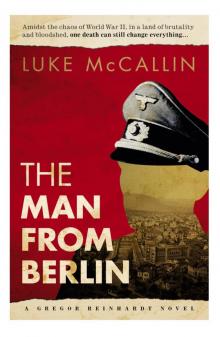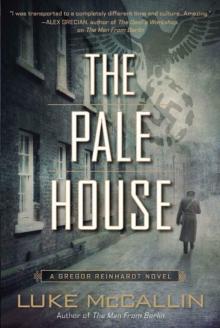- Home
- Luke McCallin
The Pale House Page 9
The Pale House Read online
Page 9
Men walked and shuffled past him in the darkness, flashlights painting the cobbled street in little crescents of light and dark.
“Thank you. Is the Feldgendarme who called this in here? Yes? Step forward that man, please.” A Feldgendarmerie sergeant came to attention, two privates with him, rifles over their shoulders. “Your name, Sergeant?”
“Ibel, sir.”
“Tell me what you saw and did.”
“Yes, sir. We were manning the checkpoint in Pirin Brieg, thataways,” he said, pointing toward the east, “near where the mosque is, when we heard what sounded like an explosion. We weren’t sure, like. It were muffled. More of a thud. And there was a glow, quite bright. It went out quick, and we couldn’t figure out where it had come from. But a few minutes later, we heard a burst of gunfire, then, quite soon after, a few more shots. And we were pretty sure it had come from here. So me and these two, we come up, and we find the kubelwagen in the street, just like it is.”
“And then?”
“Well, I check the passengers, and I see there’s three Feldjaeger, and one’s still alive. There’s no one around on the street at all. So I send one of my boys back in our kubelwagen to the checkpoint to call this in, and me and the other lad we wait up here.”
“What did you see? When you were waiting up here?”
“Nothing at all, sir. The street were dark. Completely silent.”
“Was the car’s engine running?”
“No, sir.”
“Did you walk up the street?”
“No, sir. It were dark. It were just the two of us. If it were Partisans, we felt better down by the car. And we could look after the wounded lad, like.”
“Did you hear anything? Voices? A car? A truck? Footsteps? Anything at all.” Ibel shook his head to everything. “So, then reinforcements arrived?”
“Yes, sir. More of our lads. Some pushed up the street without seeing or hearing anything. The rest of us began to knock on doors. We wake up the few still living here, roust them into the street, start questioning them. Nothing doing, for now. They can’t hardly speak a word of German, and we’ve no translator. And then your lot turned up. The captain, here, and his men. Then you.”
“That’s it?”
“That’s it, sir.”
“You sure?”
“Sir.”
“Did you touch the bodies, Sergeant?”
“Well, yes, sir. To check if they were alive.”
“Did you move them?”
“Only the wounded one, sir. We got the wounded one out. We left the two dead ones. It was Günsche’s idea to leave them,” he said, indicating one of the privates. “He said any investigation would want to see where they died. He did right, then, did he?”
“He did right,” said Reinhardt, directing a tight smile at the Feldgendarme private. “You familiar with this street, Sergeant?” The Feldgendarme nodded, his lips pursing. “What goes on here, normally?”
“Not much, sir. It’s part of our patrol sector, but we don’t come much. Most of the houses up here is empty. Damage, you see. Just up there, the Allies dropped a load of bombs, so the street’s all ruined. And it’s a bit close to the mountains, so people is afraid of Partisans. And anyways, they’re building some defense works up there.”
“Who is?”
“Construction troops and the like. There’s a work site up there.” The sergeant indicated the top of the street. “Couple of KEEP OUT signs, some material in a locked shed. A bulldozer.”
“What are they building?”
“An anti-aircraft battery, something like that. At least, they was. They’ve not been there the past couple of days. Not since . . . I mean, since the defense plans . . .” The sergeant paused, sidled closer. “Is it true, sir? ’Bout the plans? That they’ve been stolen?”
“Thank you, Sergeant,” Reinhardt said, avoiding Ibel’s question. “If you remember anything else, be sure to let me know.” He looked over at Lainer, at Benfeld standing just behind them. Time to move. “Lainer, get a couple of your men to stand guard down here. No one gets past until I say so. Frenchie, you can help me. First thing, find me a flashlight, please.” He glanced at the sky. The moon was not far off full, but it was hidden behind a rumpled sky of low cloud, only a silvery glimmer any proof it was up there. “Second, get on the radio, see if we can scrounge up some light. A searchlight or something like that. See if the air defense people have one on a truck we could use. And then get us a translator. Get on to operations. They should have someone.” Benfeld nodded, passing Reinhardt a flashlight already lit, then ducking away. “Lainer, I don’t know what we’ll find, seeing as the scene has been trampled over the last half hour. And I don’t know if the shooters are still here. I doubt it, but you never know. So, just follow my lead. All right?”
Reinhardt walked slowly up to the car, playing his light across it. The kubelwagen was starred with bullet holes, rosettes of bright metal, and the windshield was shattered, only triangular shards left clinging to the frame. The firing had come from the front and sides, it seemed. It had really been poured into the vehicle, riddling its occupants, and probably—hopefully—killing the front passengers instantly. The two Feldjaeger sat slumped with their heads back and mouths open, as if they were staring up at the night sky in wonder. The fronts of their uniforms were soaked red from multiple bullet wounds, and their skin, where it was exposed, had been shredded by flying glass from the windshield.
“Poor fucking bastards,” Lainer grated. “To think they’d end up shot to pieces, like this. Bader survived Stalingrad, and Pollmann . . .” He trailed off.
Reinhardt tuned Lainer out, shining his light inside the car, the flashlight’s beam refracting and sliding over the thousands of pieces of glass coating the interior. There were no good ways to go out in a war, he knew—other than in a hospital, doped up on morphine, maybe with a pretty nurse holding your hand as you went. There were three assault rifles inside the car. One on the floor in the back, one racked behind the driver, and the third standing between the front passenger’s knees. Their equipment was, from what he could see, in order. Helmets, gorgets, webbing, pouches, bayonets. He reached in, thumbed back the catch on one of the magazine pouches to see three spare magazines. A flashlight was clipped to the passenger’s webbing and the driver had a compass on a lanyard around his neck, a nice piece, edged in brass. Both men wore Iron Crosses on their tunics. In their breast pockets, they both had their soldbuchs—their pay books—and wallets with a few Reichsmarks and some kuna, the local currency, in them.
He craned his neck in farther, seeing the key in the ignition. He wobbled the gear stick. Neutral. The hand brake was not engaged. Worming himself back out, he shone the flashlight at the kubelwagen’s rear, where it rested against the wall. The car had crunched into the flaky stone of the wall. Bits of stone and cement dusted the ground, and the rear light was cracked. Looking forward, he saw that the kubelwagen’s front wheels were turned slightly to the driver’s left. He turned his flashlight on the ground around the car, moving the light slowly and finding a shell casing, the brass winking up at him from the folds between the cobbles.
Two sets of gunfire, the sergeant had said. A heavy burst, then shots.
Wheels turned. Neutral gear. The car had probably rolled backward after the driver had died, which meant they had been shot farther up.
Reinhardt motioned to Lainer to walk on the other side of him and began to move slowly up the hill, swinging his flashlight from left to right and counting off the steps. He passed twenty when his flashlight picked out a gleam in the road ahead, then a second, a third, a slew of them. He knelt by the first, picking up a brass shell casing. He craned his neck around at the sound of quiet footsteps, and Benfeld dropped to his knee next to him.
“What do you say, Frenchie?” he said, softly.
Benfeld picked up one of his own. “Nine-milli
meter,” he said. “There’s a bloody lot of them,” he muttered.
Reinhardt shone his flashlight in a wide arc. There were two broad groupings of casings. “One shooter to the left, one to the right.” He aimed the flashlight straight up the hill. “There. More. Three shooters, probably. One to either side, one in front. Nine-millimeter casings. Probably MP 40s. Say three full magazines. About ninety-six rounds.”
“Bastards,” grated Lainer.
The three flashlights were not much help, but Reinhardt was able to make out the general shape of the street. There were gaps in the houses up ahead, walls tumbled out and down across the cobbled road, roofs caved in or gone completely. This must have been where the bombing had hit the street, Reinhardt thought, his feet crunching across pieces of stone and masonry. Up ahead was a white signboard, red letters printed across it. KEEP OUT—CONSTRUCTION ZONE, a line of timber trestles marching across the width of the street as if to emphasize the point. The bulldozer the Feldgendarme sergeant had mentioned was parked up ahead to the left, side-on to the street, its blade resting almost against a house that, probably, was due for demolition. Just beyond it stood a small wooden hut, the whole thing wrapped in a heavy chain, presumably to secure whatever materials were stored inside it.
Beyond the sign, the street seemed to end. The houses on either side were gone; the whole expanse, what he could see of it, was graded flat except for two mounded depressions. Those were probably the bases for the anti-aircraft guns the sergeant had mentioned.
Dead end, Reinhardt thought, except if you were on foot. On foot, you could escape across that construction site, move farther up the hill, or melt away into the houses to either side. If it was Partisans, they could do that with their eyes closed, he thought, remembering the way he had been led that winding, circuitous route through the old town to that meeting with Dr. in his safe house, the Partisans taking every precaution before delivering him to the man who was Senka—“The Shadow”—the man the Gestapo had most wanted to lay hands on. Not for the first time, Reinhardt wondered where was, what had become of him, wondering as well if this new Partisan, this Valter, had replaced him.
But if you weren’t a Partisan . . . If you were something else, or if you had a car, or a truck, the only way out of here was down. Back past that car you had just shot up. Which meant someone in that crowd of townspeople had to have heard or seen something.
Which also meant something had pulled the Feldjaeger’s attention up here. This was an isolated part of town, unless they wandered up here by accident, new to the town, not knowing where they were going.
“Lainer. How long had those three been patrolling?”
“Past two days.”
“Up here?”
“Hereabouts.”
Reinhardt looked down the hill, at the firefly play of light at the bottom of the street. You would have to know these streets to navigate them on a night like this, he thought. Not to mention, run no risk or fear of being stopped. But the Feldjaeger, he thought, turning back, aiming the spike of his flashlight’s beam in front of him, had stopped for something, or someone.
One of the trestles was awry, and there was a gap between it and the next one. There were no marks on the ground Reinhardt could see when he played his flashlight over it, but he passed through the gap easily, standing on the other side, looking at the bulldozer, then at the house.
There was a door just to the left of the bulldozer’s blade. Rather, it was an opening, with no door in it. Reinhardt held the flashlight well out to the side of his body and aimed it into the house, peering around the frame of the door, his head jerking back at a reek that pushed out of the house, a stab of something sulfuric, a rotten-egg stench. Pushing his head back in, it seemed to be one room, empty of any furnishings, with another door on the far side. He drew and cocked his pistol, the sound harsh and metallic in the still air. He heard Lainer and Benfeld do the same, then stepped slowly into the house.
The floor was wood and the boards creaked under his feet. He took two steps, a third, then gave up trying to walk quietly, concentrating instead on what he could see. The floor was covered in dust and debris, and there were clear marks in it. Footsteps, drag marks, all leading across to that other door. He pointed at the floor, then at the door, and Benfeld and Lainer moved to flank him as he paused, then pushed it open.
There was darkness on the other side, and then Reinhardt saw the steps that led down to what had to be a basement. Pointing the flashlight down, he saw the wear on the steps, bright shards and splinters standing across the flat sheen of old wood, and something else. Something dark red, almost brown, smeared here and there. He walked down, the stairs creaking alarmingly under his weight, a smell of damp and oil rising to meet him, that reek from upstairs fading away. He stepped off the bottom step, swung his flashlight’s beam across a floor of beaten earth, pounded flat, and then his light froze.
There was a confused play of shadows across the basement’s walls and floor as Lainer and Benfeld clattered down behind him, but their lights steadied, and the three flashlights shone full and bright upon the bodies that lay there.
“Reinhardt, just what the hell is going on here?” grated Lainer.
The basement was low, and none of them could quite stand upright under the wooden beams holding up the ceiling. Reinhardt shifted sideways down toward the bodies and knelt, playing his flashlight slowly across them from left to right. There were five bodies. All men, and all quite savagely mutilated. Their faces had been smashed, their noses and mouths caved in. The flashlight gave the wounds a terrible depth and darkness, like holes that had been dug down into places that should never have been seen. On top of the matted red ruin of their faces, their foreheads were cratered, each one, with the starred exit point of a gunshot. Heaving one of the bodies over, and feeling a sudden and unexpected sense of déjà vu, he saw the hole in the back of its head.
“Reinhardt,” Lainer said, again. “What is this?”
“These bodies were never meant to be found.” Reinhardt looked up at the two officers, their faces seemingly suspended in midair, lit from beneath, ghoul-like. “Somehow, your men must have come across this. Or across the edge of it. This is a cover-up. At least, it was meant to be. And, in terms of cover-ups, this one is, to put it mildly, excessive.”
“And that matters?”
“It matters, Lainer. It might give us an indication of who did this. Who would want to hide something like this? Who stands to lose from this being found?”
“Well? Can you tell?”
Reinhardt held up a placatory hand, forestalling Lainer’s protest. “I will do my best for you, Lainer. And for your men.”
From upstairs, there came the creak of wood, a confusion of voices, and then someone called out.
“Benfeld, get upstairs and see what’s going on. I don’t want half the army traipsing around down here.”
“What do you want me to do?” said Lainer.
“Can your men keep this place secure?”
“Yes.”
“Then only those I allow down here may come. Anyone else . . . Well, it’s about time we used our vaunted Feldjaegerkorps authority to tell others to get lost.” The tiniest smile fissured Lainer’s taut features. “You should go and do that, now.”
Lainer nodded, turned to leave, then paused. “Anything you need, Reinhardt. You tell me.”
Left alone, Reinhardt sat back on his heels, his mind ticking over, slowly, then faster, his tongue stroking that gap in his teeth. Five head shots. Five bodies here. Three more up in that forest clearing. Shot the same way, but then burned. Evidence destroyed. But not here. He looked up at the wall, up at the ceiling, seeing, imagining, that bulldozer up there. This house part of a construction zone. The wall coming down, rubble burying all this, obliterating it, as if it had never been.
“They were shot. Then their faces were smashed in,” he said, talking to h
imself. The wounds to the faces had not bled, meaning they were caused after death. “Then they were dumped here to be buried. Someone . . .” His mind ticked over, gears clicking and moving, thoughts shifting, moving around pieces of a puzzle he could not know the shape of. Someone had gone to a lot of trouble to try to dispose of these bodies. He flexed the arm of one of the bodies, or at least tried to. Rigor mortis was still present. Meaning this man had died sometime in the last day or so. Crabbing from one to the other, he checked a limb on each of them. They were all the same, which meant they had all died at roughly the same time.
“You poor bastards,” he muttered to himself. He drew back the sleeve of the body nearest him. Ligature marks. The flashlight made a mockery of colors, giving everything a flat, sepia tone, but Reinhardt guessed they would stand out livid, purpled, like bruised fruit. There were ligature marks on all the bodies, he saw, as he checked them one by one, evidence that their wrists had all been bound. He examined their hands, finding most of them hardened and callused.
As he shifted one of the bodies, its foot sagged, and a shoe fell off. Reinhardt paused, staring down at the man’s foot, where the toenails glistened in the light. No socks, he realized. “Who the hell . . .” he muttered as he shifted down to the man’s foot. Who would wear no socks in weather like this? “Someone who might not have time to put them on,” he answered himself, taking off the other shoe, imagining the pounding on a door, a man rousted from sleep, dragged out into the night with only the clothes he had on. Then he frowned. The two shoes were not the same.
Looking more closely at each of the bodies, he examined the clothing. None of the men were dressed for the outdoors. None of them were dressed in clothes that seemed to fit. Laces were undone around the bulge of feet too large for the shoe, or shoes had no laces at all. Sleeves and trouser legs were too short, or too long. There were stains on them, and some of those stains were blood, almost certainly, but Reinhardt could not match up the stains to any wound on the men’s bodies. In one case, a shirt was ripped across the back, the frayed edges crusted in blood, but there was no injury on the man.

 The Divided City
The Divided City The Pale House
The Pale House The Man from Berlin
The Man from Berlin The Pale House (A Gregor Reinhardt Novel)
The Pale House (A Gregor Reinhardt Novel)